US Navy Warship Intercepts Missiles, Drones By Iran-Backed Houthis
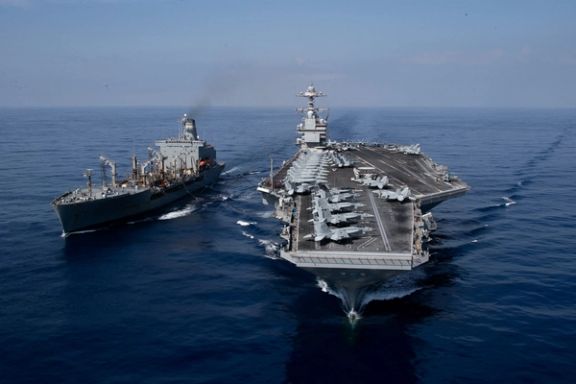
AUS Navy warship on Thursday intercepted three cruise missiles and several drones launched by the Iran-backed Houthi militants from Yemen.

AUS Navy warship on Thursday intercepted three cruise missiles and several drones launched by the Iran-backed Houthi militants from Yemen.
While Washington is on heightened alert for activity by Iran-backed groups as regional tensions soar during the Israel-Hamas war, the Pentagon said that the projectiles were potentially fired toward Israel.
The Pentagon said the destroyer USS Carney was operating in the northern Red Sea on Thursday when it brought down the projectiles and there were no injuries.
"We cannot say for certain what these missiles and drones were targeting, but they were launched from Yemen heading north along the Red Sea, potentially towards targets in Israel," Pentagon spokesman Brigadier General Patrick Ryder told reporters.
Earlier in the day, US forces in Syria also brought down two hostile drones, leading to some minor injuries. The attack took place on Wednesday against US forces at Al-Tanf base, near Syria's borders with Iraq and Jordan. Unnamed US officials did not say who was responsible for the attack, but Iranian backed militia groups have targeted the bases multiple times in the past.
The United States has sent a significant amount of naval power to the Middle East in the past week, including two aircraft carriers, their support ships and about 2,000 Marines.
While the White House says there are "no plans or intentions" for their use, it means US military assets would be in place to provide support to protect US national security interests if needed. The US also has an array of bases in the Middle East with troops, fighter aircraft and warships.
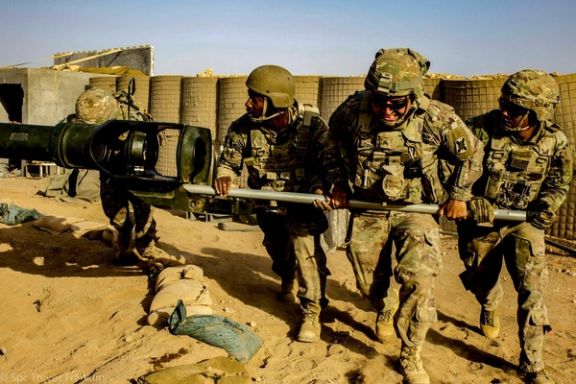
US forces in Syria brought down two hostile drones, leading to some minor injuries, US officials said on Thursday, with Washington expecting activity by Iran-backed groups.
The officials, speaking on condition of anonymity, said the attack took place on Wednesday against US forces at Al-Tanf base, near Syria's borders with Iraq and Jordan.
The officials did not say who was responsible for the attack, but Iranian backed militia groups have targeted the bases multiple times in the past.
Lebanon's Iran-aligned Al Mayadeen TV and Fars News in Iran, affiliated with Revolutionary Guard, both reported on Thursday that two US military bases in Syria have come under attack.
Al Mayadeen reported a drone attack on the Al-Tanf base and a missile attack on the Conoco base in the countryside of the northern Deir al-Zor region. It gave no further information.
US military forces in Iraq were targeted on Wednesday in two separate drone attacks, with one causing minor injuries to a small number of troops even though the US military managed to intercept the armed drone.
Since Iran-backed Hamas declared war on Israel on October 7 after an invasion by air, land, and sea, there has been significant concern that the regime will activate its other proxies in the region on Israel's borders with Lebanon and Syria, and further afield including its Yemeni proxy, the Houthis.
The United States has 2,500 troops in Iraq, and 900 more in neighboring Syria, on a mission to advise and assist local forces in combating Islamic State, which in 2014 seized swathes of territory in both countries.
With Reporting by Reuters
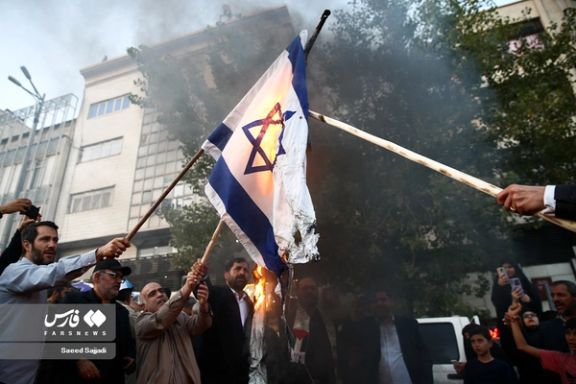
The Islamic Republic of Iran revealed again on Wednesday that it exerts considerable pressure on the country’s tiny Jewish community to denigrate Israel.
The Tehran-born Beni Sabti, an expert on Iran from the Israeli National Security and Strategy Institute, told Iran International that the Islamic Republic strong-armed the Tehran Jewish community into condemning Israel on its Telegram channel for its efforts to defeat Iran’s ally, Hamas.
“Every conscience of every free human is hurt now because of this news about this hospital that people were killed by an enemy who has no conscience and is very violent, “ wrote the Tehran Jewish community in a reference to Israel as the “enemy.”
The Tehran Jewish community, which serves as an umbrella organization for the country’s estimated 9,000 Jews, blamed the Tuesday bombing of a hospital in Gaza on Israel that resulted in casualties. However, a spokesman for Israel Defense Forces, Rear Admiral Daniel Hagari, said the Iran-backed Palestinian Islamic Jihad (PIJ) terrorist organization was responsible for the explosion at the medical center.
“An analysis of IDF operational systems indicates that a barrage of rockets was fired by PIJ terrorists in Gaza, passing in close proximity to the Al Ahli hospital in Gaza at the time it was hit,” said the IDF.
As more direct evidence emerged, it has now become clear that a Palestinian rocket hit the parking lot of the hospital setting several cars on fire and leaving behind a small crater on the ground. No one really knows the number of casualties, although Palestinians first claimed 300 were killed, and then the number of 500 and even a 1,000 were mentioned.
President Biden agreed with the IDF assessment while visiting the Jewish state on Wednesday. The US government has classified both Hamas and the PIJ as foreign terrorist organizations.
Sabti, who speaks fluent Persian and has extensively documented the clerical regime’s repression of Iranian Jews, said that “There is another war in Israel and they are afraid Muslims will come and attack them. They are afraid. This war is much bigger and dangerous. And they have to be more loyal than the revolutionaries in Iran.”
The Tehran Jewish community also wrote on Telegram: "The conscience of every freedom loving individual considers respect for fellow human beings and protecting innocent lives at hospitals one of the pillars of humanity. But savages and criminals in history have no trace of humanity and conscience in their existence and spill the blood of innocent people."
The text written to reflect the ideological rhetoric of the Iranian regime, went on to say, "Unfortunately, this crime by the fabricated and inauspicious regime has been committed with the support of arrogant powers that have always slaughtered innocent people throughout the history of man. This desperate act will clearly encourage all freedom lovers all over the world to fight the Zionist regime and defend the rights of the Palestinians."
The “arrogant powers” is a phrase referring to the United States.
The Jewish community did not name Israel but instead used the commonly used pejorative phrase invoked by Tehran’s media and rulers -- the Zionist regime -- in its Telegram post. Sabti said by omitting Israel’s, the community showed its conformity with the official jargon of the Islamic Republic.
The Iranian regime's injection of fear and propaganda into the Persian Jewish community is not a new state tactic. The now-defunct totalitarian German Democratic Republic exploited its tiny Jewish community to advance its anti-Israel and antisemitic policies. In 1967, the GDR secured a letter from some German Jews in the East German communist state who lashed out at Israel (and sided with the Arab regimes) for its pre-emptive war to stop the invasion of Arab armies in 1967,
Sabti also provided Iran International with a video of the Iranian Rabbi Yosef Lalezar, who condemned Iran.He is the Rabbi for the Iranian city of Shiraz. Sabti said Lalezar’ diatribe against Israel mirrored the language of the Tehran Jewish community but the Rabbi used the phrase “Zionist regime” that is “responsible for the crime at the hospital.”
He added that the Jewish leadership “can condemn Israel with lighter words” but “They are afraid that the revolutionaries will come and attack them.”
Sabti said a picture of the former IRGC commander Mohsen Rezaee is circulating on social media along with the message that if Israel makes any mistakes and attacks Iran or its allies, the 10,000 Jews in Iran will pay a very heavy price.
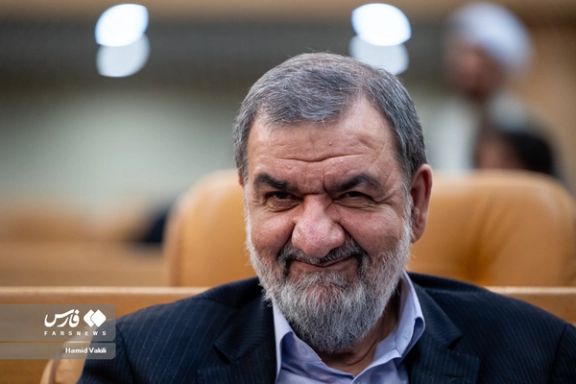
The Iran expert said it is fake news and was distributed two years ago, but many Iranians Jews believe the Rezaee story.
Sabti said “There is an expectation that they condemn Israel. They see the threat and it is coming. For them it is real. In 2008 and 2009, when there was another war between Hamas and Israel, a Jewish Iranian told me that some regime supporters went to Jewish shops and said they will take the businesses to avenge what is happening it is Gaza.”
Iran International reported in September that the Tehran Jewish community issued a semi-coded warning to its members not to participate in protests for the one-year anniversary of Mahsa Amini’s murder. The remembrance of Amini coincided with the Jewish New Year on September 16, prompting community leaders to warn Jews to stay off the streets.
Prior to Iran’s Islamic revolution in 1979, Iran’s Jewish population numbered at least 100,000, most of whom fled after Ayatollah Ruhollah Khomeini seized state power.

The Central Bank of Iran announced that it has allocated nearly $3 billion since March to imports medicines, pharmaceutical raw materials, and medical equipment and supplies.
However, reports from Iran in recent weeks have indicated shortages of medicine and a sudden increase in the price of cancer drugs.
Mostafa Qamarivafa, the director of public relations in Iran’s Central Bank, said that $2.2 billion of the allocated amount has already been spent since the beginning of the Iranian year (starting March 21, 2023). In the government-controlled Iranian economy, the state subsidizes the imports of medicine by offering cheaper dollars for imports.
Also, a total of $156,000,000 of preferential currency subsidy has been allocated this year to import powdered milk, raw materials and health supplements, Qamarivafa added. However, there are reports of shortages of baby formula and a rationing at pharmacies.
These remarks run counter to the reports earlier in the day about the exorbitant prices and the severe shortages of cancer drugs in Iran.
Shargh newspaper in Tehran reported that the sudden increase in the price of cancer drugs has shocked patients. The reason of the unexpected hike seems to be the sudden removal of governmental currency subsidies, Shargh quoted some pharmacists as saying.
This is while the deputy chief of the Central Bank of Iran, Mohamamd Shirijian, said on October 17 that the country's foreign reserves are increasing due to the growth of oil and non-oil exports in spite of US sanctions.
The claims seem in contradiction to a report by reformist daily Ham-Mihan released on October 16 that forecasted a budget deficit twice as big as the figure in the previous year.

Two US military bases in Syria have been targeted in drone attacks, suggesting Iran's proxies are becoming ever more emboldened to expand Hamas' proxy war further.
Both Lebanon's Iran-aligned Al Mayadeen TV and the IRGC-affiliated Fars news agency, reported the news on Thursday though the US has not yet made official comment on the incidents.
According to Al Mayadeen, a drone strike occurred at the Al-Tanf base near Syria's borders with Iraq and Jordan, while a missile attack targeted the Conoco base in the northern Deir al-Zor region. However, no additional details have been provided.
The Al-Tanf base is notably significant for American forces in southeastern Syria and is situated in the triangular border area shared by Syria, Iraq, and Jordan.
Since Iran-backed Hamas declared war on Israel on October 7 after an invasion by air, land, and sea, there has been significant concern that the regime will activate its other proxies in the region on Israel's borders with Lebanon and Syria, and further afield including its Yemeni proxy, the Houthis.
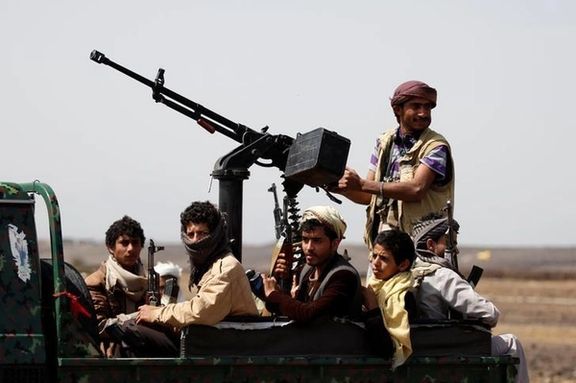
Iran's foreign minister Hossein Amir-Abdollahian has sent direct warnings that there will be "a huge earthquake" should Israel continue its bombardment of Gaza which followed the Hamas invasion which saw the massacre of hundreds of civilians and capture of at least 200 more.
Hezbollah, Iran's biggest proxy, which sits on Israel's northern border in Lebanon, has engaged in an increasing number of skirmishes with Israel in recent days leading to 28 towns and villages in northern Israel to be evacuated.
Meanwhile, there are reports of minor injuries to coalition forces in Iraq following a series of drone attacks on US bases over the past 24 hours.
Two drones targeted the al Asad airbase in western Iraq, which is utilized by US forces, while another drone targeted a base in northern Iraq.
According to a US official who spoke with The Associated Press, all three drones were intercepted. Two of them were successfully neutralized, but the third drone was only partially damaged, resulting in minor injuries among coalition forces at the western base.
The US officials were not authorized to publicly discuss the attacks and spoke anonymously.
"In this moment of heightened alert, we are vigilantly monitoring the situation in Iraq and the region. US forces will defend US and coalition forces against any threat," stated Central Command in a Wednesday release.
Iran-backed Iraqi militia groups have issued threats against US facilities due to US support for Israel in recent days.
The Islamic Resistance in Iraq claimed responsibility for both attacks and said it intended to take further action against the "American occupation." Kataib Hezbollah militia leader Ahmed Abu Hussein al-Hamidawi warned that US bases could be attacked by rockets, drones and special forces.
The group issued a statement after a devastating explosion at a Gaza hospital on Tuesday night, blaming the United States and its support for Israel for the incident. They called for an end to the US presence in Iraq.
The statement concluded with a declaration: “These evil people must leave the country. Otherwise, they will taste the fire of hell in this world before the afterlife.”
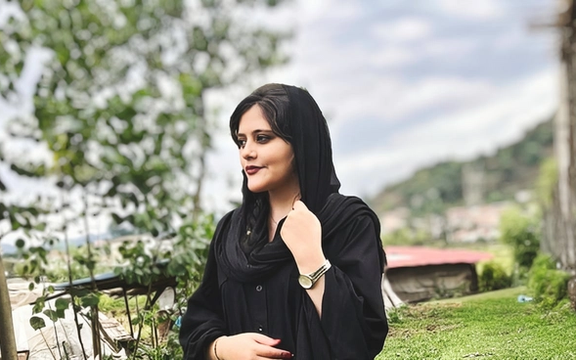
This year's Sakharov Prize has been posthumously awarded to Mahsa Amini, who died last year in the custody of morality police, sparking the greatest ever challenge to the Iranian regime.
The prize is awarded by the European Parliament to individuals and groups for defending freedom of thought and human rights.
EU Parliament President Roberta Metsola said that 22-year-old Amini's death "marked a turning point," the Women, Life, Freedom uprising which followed, posing the gravest challenge to the regime since it came to power in 1979.
Arrested for not wearing her hijab properly, Amini was found to have been dealt severe blows to the head, though the regime never acknowledged responsibility nor brought the culprits to justice.
"It has triggered a women-led movement that is making history," Metsola said, adding that the movement stood for "dignity and freedom in Iran."
She said that the award was a tribute to the brave women, men and young people of Iran who are leading the push for change in a revolution which has seen the deaths of hundreds in the hands of brutal regime security forces and tens of thousands more arrested.
Amini hailed from the predominantly Kurdish city of Saqez in western Iran.
The Sakharov prize is named in honor of Soviet physicist, political dissident and 1975 Nobel Peace Prize laureate Andrei Sakharov.
Last year, the Sakharov Prize was awarded to the Ukrainian people for protecting democracy, freedom and rule of law following Russia's invasion which continues to today.